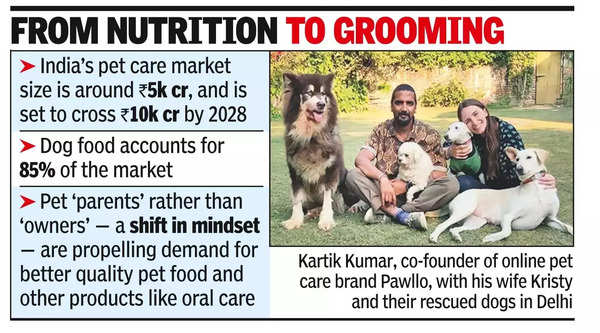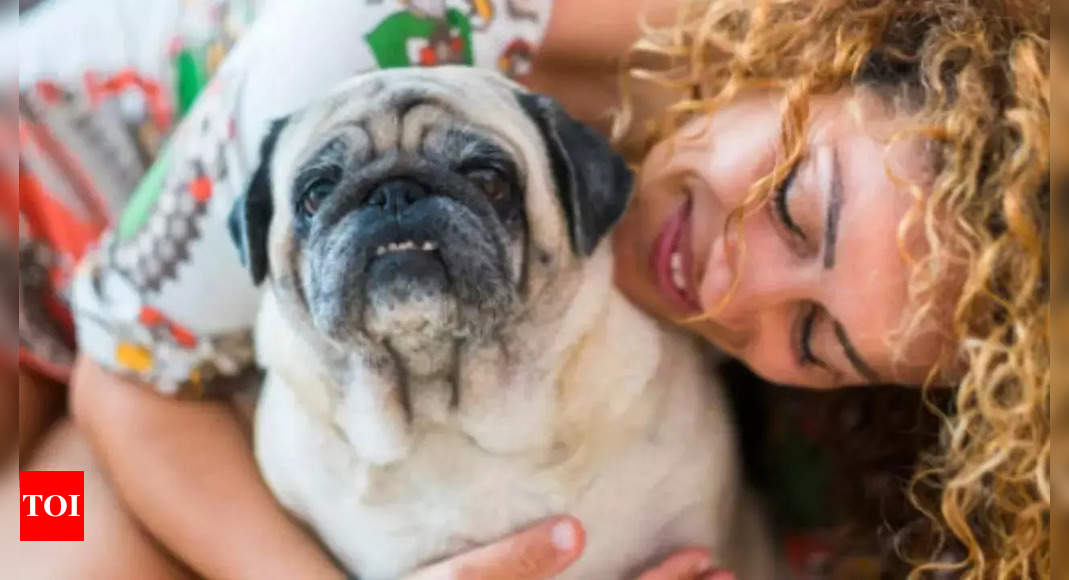MUMBAI: It is a millennial and Gen Z-led economy. Not only are they driving growth of e-commerce, cafe space and other convenience-based services, but India’s nascent pet care industry is also riding on them to expand its market.
Gen Z and millennials are increasingly identifying themselves as pet ‘parents’ rather than pet ‘owners’ – a shift in mindset that’s propelling demand for not only better quality pet food and nutrition but a host of other pet products in categories like oral care, gourmet snacks and lifestyle.
“Pet adoption has been more prevalent among Gen Z and millennials. Their need for convenience, coupled with a willingness to spend on their pet children, has led to the emergence of a service ecosystem of pet grooming, pet cafes, and pet insurance,” a spokesperson at Nestle India, which runs its pet business under the Purina brand, told TOI.

Consider this: 33-year-old animal enthusiast Kartik Kumar left his job in the UK in 2016 to come back to India and start a veterinary clinic to help pets and community animals in Delhi. Today, Kumar and his wife Kristy share their rented home in South Delhi with 15 rescued dogs, six of whom they intend to give up for adoption. Kumar has also co-founded online pet care brand Pawllo alongside a friend.
Salil Murthy, managing director at Mars Petcare India, said the industry has the potential to grow at a CAGR of 16-18% over the next 5-6 years. “Go back 20 years, pets used to be outside the house. Since then, pets have come into the living rooms and during Covid, metaphorically speaking, they entered the bedroom… they have become a part of the family. Now, people have started asking what they can be fed, what special things can they be provide with?” Murthy said.
In fact, in big cities where nuclear families are increasingly adopting pets, a monthly average expenditure of Rs 5,000 or more on pets is becoming routine. In Bengaluru, the average spend is estimated at Rs 3,000 per month, said Shashank Sinha, CEO at Drools Pet Food. “One key trend is the recognition of pets as companions who can help combat loneliness and anxiety. Smaller families and busy schedules create a desire for emotional support and loyalty that pets offer,” Sinha added.
Ishita Talwar (25) from Jharkhand said that she plans her road trips and travel based on the schedule and comfort of her four-year-old Labrador. “Our generation is more sensitive to pets and their needs than what our parents were earlier,” she said, adding that monthly expenses on pets go up during seasons like winter as households spend on pets’ winter clothes and other accessories. Rashi Narang, founder at Peak XV Partners and Verlinvest-backed startup Heads Up For Tails, which runs 90 pet care stores, said that people initially came to the stores to buy essentials but ended up spending more when they discovered a wider range of pet products.
In premium households untouched by inflation, demand for gourmet pet food and treats is growing. “Oral care for dogs is in huge demand and our brand Dentastix is doing well. We are also seeing significant growth in our treats segment,” Murthy said.
Gen Z and millennials are increasingly identifying themselves as pet ‘parents’ rather than pet ‘owners’ – a shift in mindset that’s propelling demand for not only better quality pet food and nutrition but a host of other pet products in categories like oral care, gourmet snacks and lifestyle.
“Pet adoption has been more prevalent among Gen Z and millennials. Their need for convenience, coupled with a willingness to spend on their pet children, has led to the emergence of a service ecosystem of pet grooming, pet cafes, and pet insurance,” a spokesperson at Nestle India, which runs its pet business under the Purina brand, told TOI.

Consider this: 33-year-old animal enthusiast Kartik Kumar left his job in the UK in 2016 to come back to India and start a veterinary clinic to help pets and community animals in Delhi. Today, Kumar and his wife Kristy share their rented home in South Delhi with 15 rescued dogs, six of whom they intend to give up for adoption. Kumar has also co-founded online pet care brand Pawllo alongside a friend.
Salil Murthy, managing director at Mars Petcare India, said the industry has the potential to grow at a CAGR of 16-18% over the next 5-6 years. “Go back 20 years, pets used to be outside the house. Since then, pets have come into the living rooms and during Covid, metaphorically speaking, they entered the bedroom… they have become a part of the family. Now, people have started asking what they can be fed, what special things can they be provide with?” Murthy said.
In fact, in big cities where nuclear families are increasingly adopting pets, a monthly average expenditure of Rs 5,000 or more on pets is becoming routine. In Bengaluru, the average spend is estimated at Rs 3,000 per month, said Shashank Sinha, CEO at Drools Pet Food. “One key trend is the recognition of pets as companions who can help combat loneliness and anxiety. Smaller families and busy schedules create a desire for emotional support and loyalty that pets offer,” Sinha added.
Ishita Talwar (25) from Jharkhand said that she plans her road trips and travel based on the schedule and comfort of her four-year-old Labrador. “Our generation is more sensitive to pets and their needs than what our parents were earlier,” she said, adding that monthly expenses on pets go up during seasons like winter as households spend on pets’ winter clothes and other accessories. Rashi Narang, founder at Peak XV Partners and Verlinvest-backed startup Heads Up For Tails, which runs 90 pet care stores, said that people initially came to the stores to buy essentials but ended up spending more when they discovered a wider range of pet products.
In premium households untouched by inflation, demand for gourmet pet food and treats is growing. “Oral care for dogs is in huge demand and our brand Dentastix is doing well. We are also seeing significant growth in our treats segment,” Murthy said.
Source link

